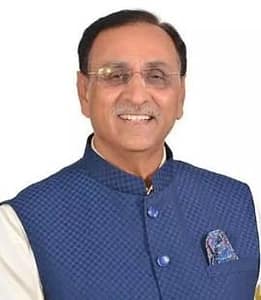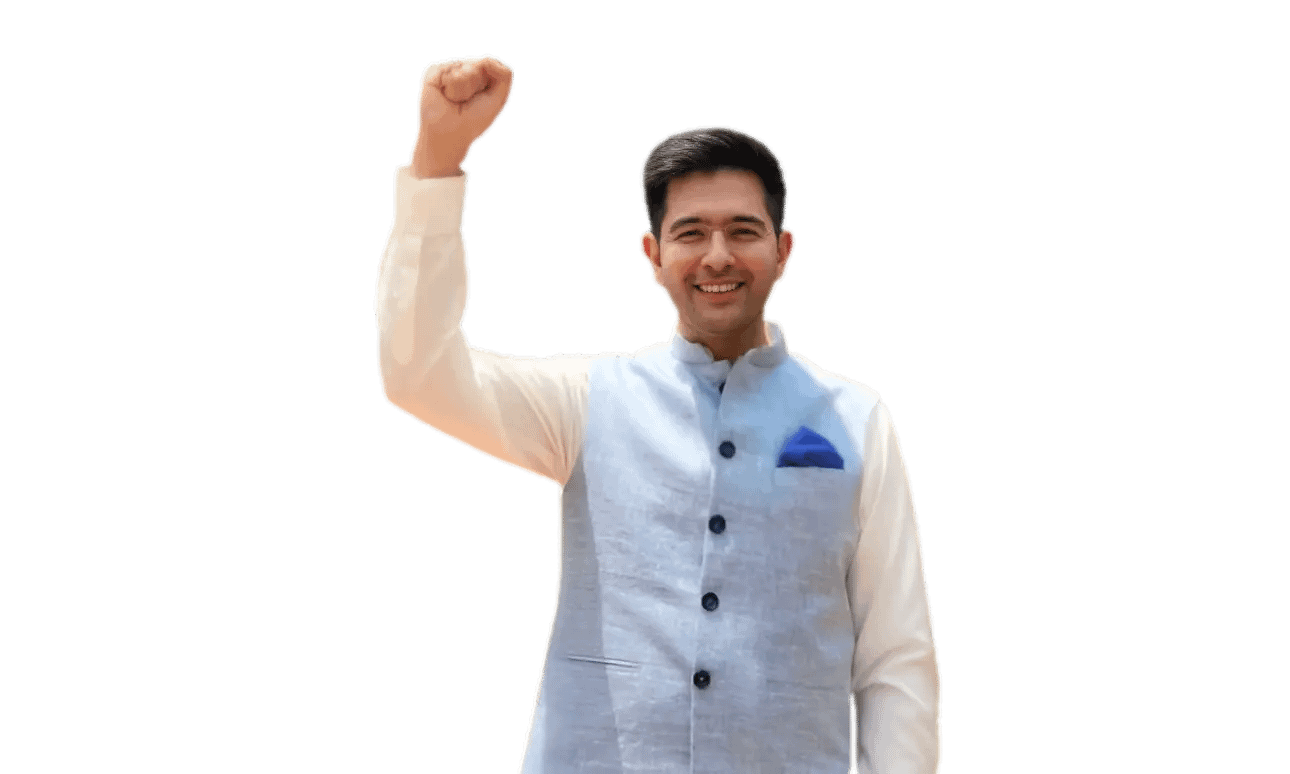Vijay Rupani Chief Minister of Gujarat Introduction.

Vijay Ramniklal Rupani, a prominent name in Indian politics and the Bharatiya Janata Party (BJP), served as the 16th Chief Minister of Gujarat from August 2016 to September 2021. Known for his humble beginnings, disciplined political career, and administrative skills, Rupani carved a niche for himself through his dedication, ideology, and leadership qualities. His journey from a municipal councilor to the highest political office in Gujarat reflects a classic case of persistence, grassroots connection, and organizational loyalty.
Vijay Rupani Early Life and Background
Vijay Rupani was born on August 2, 1956, in Rangoon (now Yangon), Myanmar (then Burma), to Ramniklal Rupani and Mayaben Rupani. He belongs to a Jain Bania family with strong cultural roots in Gujarat. Due to political instability in Burma during the 1960s, the family migrated back to Rajkot, Gujarat, India, where Rupani grew up.
He completed his schooling in Rajkot and went on to earn a Bachelor of Arts degree and a Bachelor of Law (LLB) from Saurashtra University. During his student years, Rupani was deeply influenced by nationalist ideologies and the philosophies of leaders like Mahatma Gandhi and Deendayal Upadhyaya. His entry into politics was marked by participation in student movements and public causes.
Vijay Rupani Early Political Career and Activism
Rupani’s political journey began with his association with the Rashtriya Swayamsevak Sangh (RSS) and later with the Akhil Bharatiya Vidyarthi Parishad (ABVP), the student wing of RSS. During the Emergency period (1975–77), imposed by then-Prime Minister Indira Gandhi, Rupani was actively involved in opposing the authoritarian measures. He was even jailed for 11 months under the Maintenance of Internal Security Act (MISA), reflecting his early commitment to democratic values and civil liberties.
After the Emergency, he formally joined the Jan Sangh, which later became the Bharatiya Janata Party in 1980. He quickly rose through the ranks, thanks to his organizational capabilities and loyalty to the party’s ideology.
Vijay Rupani Rise in Municipal Politics
Vijay Rupani entered electoral politics in 1987 when he was elected as a municipal councillor in Rajkot. His performance as a corporator was appreciated, leading to his appointment as the Chairman of the Rajkot Municipal Corporation Standing Committee for several years. Under his leadership, Rajkot witnessed several urban development initiatives and improved public infrastructure.
Between 1996 and 2002, he served as the Chairman of the Gujarat Tourism Development Corporation (GTDC), where he promoted tourism and cultural heritage sites across Gujarat.
Vijay Rupani Business Ventures and Social Work
Alongside his political career, Rupani was also involved in business and social service. He helped run his family’s trading business and was an active member of various philanthropic organizations. He co-founded the Pujit Rupani Memorial Trust, named after his late son, which focuses on health care, education, and social welfare for the underprivileged in Rajkot.
He was also associated with various trusts, educational institutions, and service organizations that contributed to community development.
Vijay Rupani Entry into State-Level Politics
Rupani’s first significant breakthrough in state-level politics came when he was elected to the Rajya Sabha from Gujarat in 2006, serving a term until 2012. During this tenure, he raised multiple issues related to Gujarat’s development in the Upper House and became known for his soft-spoken yet firm approach.
After completing his Rajya Sabha term, Rupani returned to state politics. He contested the 2014 by-election from the Rajkot West Assembly seat, which was vacated by Vajubhai Vala when the latter was appointed as Governor of Karnataka. Rupani won the seat comfortably and soon became a key leader in the Gujarat BJP setup.
Vijay Rupani Ministerial Roles in Gujarat
Following his victory in the 2014 assembly by-election, Rupani was appointed as the Minister for Transport, Water Supply, Labour and Employment in the Anandiben Patel-led government in Gujarat in 2016. During his short stint in this role, he focused on improving road connectivity, ensuring efficient public transport, and addressing labor welfare issues.
He was also appointed as the State BJP President in February 2016. His tenure as party president saw a strengthening of BJP’s grassroots organization and coordination with the central leadership.
Vijay Rupani Chief Minister of Gujarat (2016–2021)
Becoming Chief Minister
In August 2016, following the resignation of Chief Minister Anandiben Patel, the BJP leadership selected Vijay Rupani as the new Chief Minister of Gujarat, with Nitin Patel as the Deputy CM. His selection was seen as a consensus choice by the party leadership due to his clean image, administrative experience, and loyalty to the organization.
Leadership Style and Governance
Rupani’s tenure as CM was characterized by a focus on:
- Transparency and e-Governance: He promoted digital governance to improve transparency and reduce corruption in administrative processes.
- Industrial Development: Gujarat continued to attract investment under his leadership, with the Vibrant Gujarat Summit gaining prominence.
- Infrastructure Projects: His government prioritized road construction, smart cities, and irrigation projects, particularly in Saurashtra and Kutch regions.
- Health and Education: Rupani launched several health care schemes, including the MA Yojana, and initiated reforms in school education with digital classrooms and better facilities.
- COVID-19 Management: During the pandemic, Rupani faced both challenges and criticism. While the government undertook massive testing, isolation centers, and vaccination drives, there were concerns about oxygen shortages and hospital preparedness.
Major Schemes and Policies
- Sauni Yojana: A major irrigation scheme aimed at diverting floodwaters from the Sardar Sarovar Dam to the water-scarce Saurashtra region.
- Digital Gujarat: A campaign to digitize public services and ensure online delivery of certificates, licenses, and permissions.
- Gujarat Industrial Policy 2020: Aimed at enhancing ease of doing business and attracting global investment.
- Garib Kalyan Mela: Aimed at providing benefits of government schemes directly to the underprivileged through direct transfers and public interaction.
- Zero Tolerance on Corruption: Rupani took a strong stand on corruption and emphasized clean governance, especially within the bureaucracy.
Vijay Rupani Electoral Success
Under his leadership, the BJP won the 2017 Gujarat Assembly elections, although with a reduced majority. The party secured 99 seats out of 182, a notable dip compared to previous elections, but sufficient to retain power. Despite a tough contest from the Congress, particularly led by the Patidar agitation and youth leaders like Hardik Patel, the BJP’s organizational strength and central leadership backing helped it secure victory.
Resignation and Transition of Leadership
In a surprise political move, Vijay Rupani resigned on September 11, 2021, ahead of the 2022 assembly elections. His resignation was part of the BJP’s strategy of leadership renewal in various states. The party appointed Bhupendra Patel, a relatively lesser-known figure from the Patidar community, as his successor.
Rupani gracefully accepted the decision and extended his full support to the new leadership, emphasizing his commitment to the party and its mission.
Post-Chief Minister Role
After stepping down as CM, Rupani continued to remain active in Gujarat politics and within the BJP organization. He focused on mentoring young leaders, engaging in party outreach programs, and contributing to policy discussions. His political journey remains a case study in discipline, loyalty, and silent yet impactful leadership.
Vijay Rupani Personal Life
Vijay Rupani is married to Anjali Rupani, and the couple has one son and one daughter. Their eldest son, Pujit Rupani, tragically passed away in an accident in 2006, after which the family established the Pujit Rupani Memorial Trust to carry forward charitable activities.
Rupani is known for his simple lifestyle, vegetarianism, and commitment to Jain principles of non-violence and truth. He maintains a strong connection with his constituents in Rajkot and is often seen attending public events, temple visits, and social welfare programs.
Legacy and Impact
Vijay Rupani’s legacy as Chief Minister is marked by:
- Strengthening Gujarat’s administrative framework.
- Promoting investment and industrialization.
- Ensuring clean governance.
- Balancing party interests with public welfare.
- Representing the non-Patel communities while maintaining social harmony.
Though he did not possess a flamboyant public image, his administrative stability and approachability made him a respected leader. His ability to maintain cordial relations with both party cadre and opposition leaders contributed to a relatively peaceful political climate in Gujarat during his tenure.
Conclusion
Vijay Rupani’s political journey is a remarkable story of perseverance, discipline, and public service. From being a student activist and emergency detainee to leading one of India’s most industrially progressive states, he exemplified the values of service, simplicity, and governance rooted in ideology. Though he has stepped away from the spotlight, his contributions to Gujarat’s growth story and to the BJP’s organizational development continue to be acknowledged across political and public platforms.
As Gujarat moves ahead under new leadership, Rupani’s years as Chief Minister remain a defining chapter in the state’s modern political history.




One thought on “Vijay Rupani Chief Minister of Gujarat”